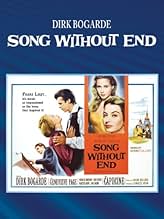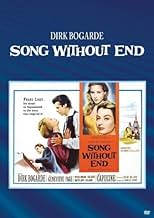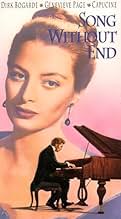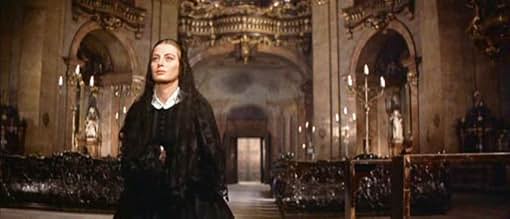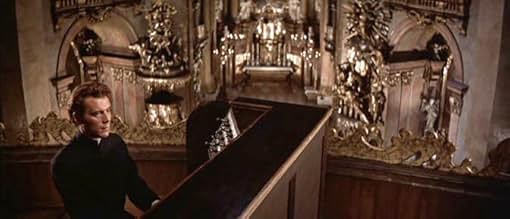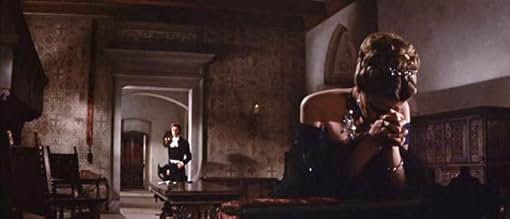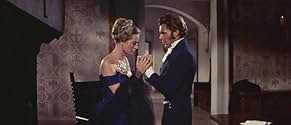Adicionar um enredo no seu idiomaThe romantic story of Hungarian pianist Franz Liszt (Sir Dirk Bogarde), whose scandalous love affair forced him to abandon his adoring audiences.The romantic story of Hungarian pianist Franz Liszt (Sir Dirk Bogarde), whose scandalous love affair forced him to abandon his adoring audiences.The romantic story of Hungarian pianist Franz Liszt (Sir Dirk Bogarde), whose scandalous love affair forced him to abandon his adoring audiences.
- Direção
- Roteiristas
- Artistas
- Ganhou 1 Oscar
- 2 vitórias e 3 indicações no total
- Thalberg
- (as E. Erlandsen)
- Chopin
- (as Alex Davion)
- Emissary
- (cenas deletadas)
- Audience Member
- (não creditado)
- Komparsenrolle
- (não creditado)
- Direção
- Roteiristas
- Elenco e equipe completos
- Produção, bilheteria e muito mais no IMDbPro
Avaliações em destaque
A Liszt concert back then if played for a mass audience was something like the reception that Elvis and The Beatles got back in their day. It aroused the jealousy of a lot of Liszt's contemporaries, but they respected his talent.
Dirk Bogarde is a capable and charismatic Liszt who had a weakness for married women. He ran off with one and had a couple of kids by her and then seduces a royal countess. The two women in question are played by Genevieve Page and Capucine.
Dirk and Cappy have a whole lot of hurdles to overcome before they can be happy, put there by the Romanov family and the Catholic Church, but it does sort of work itself out in the end.
My favorite performance in the film is that of Martita Hunt who plays a dowager German princess who offers Liszt employment when he needs it.
The film only covers a small portion of Franz Liszt's life, still it's a worthwhile biographical study.
'Song Without End' is certainly much better than Ken Russell's 'Lisztomania', a very hard to rate film that was visually striking but ruined by gratuitous excess and lack of taste, and does have many pleasures but biographically it disappoints.
It is a visually sumptuous film for starters, it's very beautifully photographed, the costumes are lavish, richly colourful and true to period and the settings, interiors and scenery are gorgeous to watch. The music is definitely the highlight of 'Song Without End', whether it is bombastic and energetic like the second 'Hungarian Rhapsody' or intimate and poignant like the third 'Liebestraume', and it's all cleverly arranged. Contrary to one reviewer the inclusion of music of other composers was quite nice though there could have been a little more of Liszt's, 'Totentanz' would have been absolutely thrilling to listen to.
One mustn't forget the magnificent playing of Jorge Bolet, absolutely agree that it is some of the best-performed classical music in film. Liszt's music is fiendishly and notoriously difficult for a pianist ('Totentanz' for example is hard enough with piano and orchestra, in solo piano version it's a killer), but Bolet , with such energetic, hugely musical and poetic playing, makes it sound effortless. 'Song Without End' is nicely directed, and never resorts to vulgarity or excess. While its representation of Liszt is not exactly a faithful one (one doesn't find it easy to believe him as that much of a womaniser, almost too much on the slightly sleazy side, and especially as a prima donna), it is not the literal character assassination of 'Lisztomania', because it also gets some things right like he was a man of great charity, was highly noble and women were attracted to him). 'Song Without End' is also not without its powerful and affecting moments, and the music plays an enormous part in why that is, the fact that Liszt played the music of other composers as well and that he was a fan of Chopin is incorporated remarkably intelligently.
The cast are very good. Whether one takes issue with how Liszt is portrayed, it cannot be blamed at Dirk Bogarde's door but how he's written. Bogarde does an excellent job, and is very believable and charismatic whether amorous or more intense in the context of how Liszt is written and as a performance in general. Genevieve Page and especially Capucine are breathtakingly beautiful, and Page also plays the film's most sympathetic character very poignantly. Martita Hunt is also memorable, Hunt as is evidenced by her definitive Miss Havisham in David Lean's classic 'Great Expectations' had a knack for stealing scenes regardless of the size of the role. Bogarde and Capucine and particularly Bogarde and Page also convince together, quite touching in fact at times.
For all its many good things, 'Song Without End' is not without its flaws. There is an exception to the high standard set by the cast, and that is agreed the miscast and out of place Lou Jacobi, whose appearance and the way he spoke being somewhat anachronistic and jarring. The film does drag in places, getting bogged down by a few strands like the greatly and too obviously romanticized romances (that are also factually distorted, the film fails to mention the Countess' emotional problems before meeting Liszt and how big a part it played in their break up).
The story here is compelling but some things that were included could have been elaborated on in more detail. While there are some things that are faithful- like his devotion for art- it is every bit as easy to spot the inaccuracies and anachronisms, like the notion of Liszt feeling inferior to Chopin with the existence of his 'Transcendental Etudes' being long before he even met Chopin . It does focus too much on the romantic side of his character and not enough on his magnetic way of performing he held that earned him the admiration of several other fellow performers (it does focus on a small portion of his life and unfortunately it is not the most compelling or the most telling of Liszt's character). Lastly, some of the script is flimsy with some soap-opera-like dialogue and areas that were potentially interesting but lack depth.
All in all, disappointing in some areas but also a film of many pleasures. 6/10 Bethany Cox
I thrilled to the bombast and impossible fingerwork of Hungarian Rhapsody No. 2. But the final piece Liszt (portrayed by Bogarde) played as he retreated to the monastery haunted me throughout my teenage years. Liebestraume No. 3 ("Dreams of Love") can either be a soothing balm or a cutting knife for the lovesick.
Bogarde, who obviously knew his onions about piano playing displayed the exact fingerwork on the proper fields of the keyboard and his body English was totally convincing. Well after all, he was not only an actor but a true artist - an accomplished writer and a painter.
Capuccine, touted as one of the most beautiful women at the time, portrayed the Princess of Witgenstein. But my heart fell for the jilted wife, the Belgian countess portrayed by Genevieve Page whom I found more,"simpatica."
The set decorations here are phenomenal, they're on par with the great 1944 film "Wilson."
The music is magnificent although we could have done without knowing about the friendship between Liszt and the anti-Semite Richard Wagner. Another flaw is the miscasting of Lou Jacobi as Bogarde's manager. Jacobi sounded like he came out of the Catskills. This film for Jacobi came after his super performance, the year before, in the beloved "The Diary of Anne Frank." (Happy Birthday Lou as you turn 95 on Dec. 28th.)
The first part of the film deals with Liszt's career. His playing in concerts in various European countries was remarkable. The second part deals with his ill-fated love with the Countess Cathryne of Lichtenstein.
While we see that Liszt entered the priesthood when his proposed marriage to Cathryne was rejected, we really can't tell if Cathryne became a nun. I imagine no since she was still technically married in the eyes of the church. Nonetheless, we have a powerful, beautifully acted film. Too bad that Totentanz, a Liszt masterpiece, was not played here. I had to know that piece of grand music in a required music course at college. Like the movie, Totentanz was a masterful piece.
Você sabia?
- CuriosidadesCharles Vidor had completed about 15 percent of this movie when he died of a heart attack on June 4, 1959. Sir Dirk Bogarde later recalled that he was "secretly relieved" by Vidor's death, since he and his co-star, Capucine had been treated badly by the short-tempered director. Vidor would often scream at Capucine to relax, and at one point, Bogarde recalled, "shook her like a dead cat." Vidor was replaced by George Cukor, who got along much better with his stars, and was more of an "actor's director."
- Erros de gravaçãoGrand Duchess make reference to "Ukraine" in one scene. The term was not in wide use in the 1840s, especially not among Russian nobility.
- Citações
Countess Marie: I met Franz at a musical party. I remember he played a ballade in A-flat major by Chopin. I thought I'd never seen anything as beautiful as Franz looked when he sat at the piano. I... I wanted to cry. He watched me as he played; Franz never fails to notice a pretty woman in his audience. Afterward, he followed me into the hall. I remember he said, "May I escort you somewhere, madame?" And I said, "Yes." And he said, "Where?" And I said, "Paradise." He didn't smile - he said, "I'll call a carriage."
Princess Carolyne: Did he?
Countess Marie: What?
Princess Carolyne: Drive you there - to paradise?
Countess Marie: [a pause, and a meaningful look as she turns to leave the room] He doesn't know the road, madame.
- ConexõesFeatured in Film Profile: Dirk Bogarde (1961)
Principais escolhas
- How long is Song Without End?Fornecido pela Alexa
Detalhes
- Tempo de duração2 horas 21 minutos
- Proporção
- 2.35 : 1
Contribua para esta página



